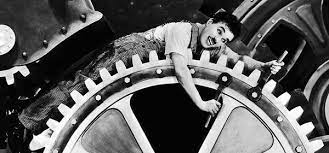by Martin Butler

Given the increasing ubiquity of technology in all our lives, it’s surely time to consider what may sound like an obvious, even stupid question but one that is actually vitally important: What is technology for?
At its simplest, technology can be understood as a tool which enables us to reach a particular end; a chimp using a stick to extract honey from a tree trunk, for example, a means to an end. That approach is crucial to our perception of the place of technology in the modern world. I visit a shop (means) to buy something (end). I get on a train (means) to arrive at a destination(end). To be able to engage in means-ends activity of any complexity is surely a sign of intelligence, showing purpose and imagination in that it seems necessary to imagine a state-of-affairs in the future that has not as yet come to pass, and of conceiving a way to achieving it. The end would be unattainable without the technology, just as the internet enables working from home in a way that would be impossible without it. On this model much technological innovation is about devising more efficient means of achieving particular ends, even though the ends were still achievable prior to the innovation. By ‘more efficient’ we mean meeting ends more quickly, doing it in a way that requires less human effort and often on an increased scale. The key innovations that were pivotal in the Industrial revolution were, for example, the machines that allowed spinning and weaving to take place on an unprecedented scale.
The main features of this model are that the means and the end are distinct, and the end is something we have identified as desirable. On these assumptions technology will always seem positive simply because it allows us to access something desirable that was previously unattainable, or, to access something desirable more efficiently than was previously the case. This model is taken as common sense in the modern world and it at least partly explains why technology is given pride of place within our culture.
But this is a misrepresentation of the place of technology in human life, principally because the relation between means and ends is not as simple as the above model suggests. An end, according to this model, is something we understand and identify as desirable independently of the technology we use to attain it. However, when we look at individual cases it becomes clear that there is usually what philosophers would describe as an internal relation between the technology and the ends it facilitates. Put simply, the means necessarily affects the nature of the ends, or at least how we conceive of the ends, which is what matters. In many cases this effect might be minimal but the more sophisticated and radical the technology the greater the effect. So, introducing a new technology is not simply a matter of devising a more efficient means to attain a preconceived end. It means a deeper change is produced.
Take for example[1] how streaming services such as Spotify have changed the way we listen to music. If listening to recorded music is the end, and in previous times having to go out to buy a vinyl record or CD was the means, then the fact that streaming services allow access to most recorded music almost immediately clearly makes it an easier and more efficient means of meeting this end. On the means-ends model described above it is obvious that using a streaming service is superior. But this is far too simplistic. Listening to recorded music is not a simple discrete experience quite separate from the means by which it is accessed. The fact that time and effort were required to choose and buy a record or CD meant that there was a ritual associated with the listening, which tended to make the experience more intense and special than listening on a modern streaming service. Certainly with the albums of yesteryear I remember becoming intimately familiar with every track and the order they came in. I also remember having to listen to tracks which didn’t immediately appeal just because it was too much trouble to skip them. No playlists then. But this meant there was time for them to grow on me – often they became my favourites. Listening was also often more of a public experience (listening with friends for example) because not everyone would have access to the album or CD, and your own precious collection was a reflection of you. I remember looking admirably at other people’s collections. I am not arguing here that streaming services are not as good as they are cracked up to be, I just want to challenge the idea that the experience of listening to recorded music has remained the same, the only change being that now we can achieve that end more easily and efficiently due to streaming technology. We actually have here two qualitatively different activities both with advantages and disadvantages, not one end which can be reached by two different means, one easier than the other. That fact that vinyl records have come back into fashion echoes this point.
A general point that might be drawn from this is that if something that was relatively difficult to access or produce becomes easier to access or produce through technology, our conception of it changes. There is a qualitative change and a different phenomenon emerges. This is important because we can make the unjustified assumption that if something is desirable in small doses then large doses makes it even more desirable, like the child who assumes that because eating one chocolate is enjoyable eating 20 will be 20 times more so. What the child doesn’t see is that increase in quantity has unforeseen consequences that go beyond anything in his experience of one chocolate, and that the limit was essential to the experience. Behind much technological innovation is the a priori assumption that more is good, quicker is good, easier is good, when we really we ought to notice that more, quicker and easier results in something different altogether. Some re-evaluation is called for.
Even in areas where technology has brought an indisputable advantage – labour saving devices in the home – the kind of changes I have pointed out still occur. Washing machines have freed our us from the tedious and backbreaking labour of hand washing clothes, but it’s not as if washing machines have simply replaced hand-washing, although this of course has happened. A generational change has occurred. People now tend to wash everything after a single wearing, throwing things in the machine without a second thought. The whole attitude to wearing and washing has changed. We’re less careful about getting our clothes dirty, yet less tolerant of dirt.
None of this means we can’t talk of ends and means, but it does mean we need to understand technology in less rationalistic terms. Better perhaps to see technology as changing the kind of lives, the kinds of practices we engage in, rather than simply allowing us to live life more easily and efficiently, as the rationalistic means-ends model would have us believe. In fact because technology changes our norms and interacts with the pre-existing culture and indeed human nature, the results can often be quite unpredictable. Few predicted some of the toxic effects of social media, for example, when on paper at least it seems like a convenient way for more people to communicate with each other more easily than was previously possible.
Another thing: despite technology having been a part of life since the beginning of human existence, something we might describe as an ideology of technology has arisen, unique to the modern era. This is the belief that technology is a kind of saviour. (And here I don’t just mean in relation to the climate crisis.)
 Technologies cease to be just a useful means of achieving things – tools which very much play a secondary role to the more important things in life – they become the central focus of the culture. Ideas of efficiency, convenience and effortlessness become primary values. Behind this is the vague ideal that when pushed to the limit, a fully technological environment will deliver a kind of prelapsarian utopia where we will be able to jump effortlessly to any end we choose. The tiresome business of having to work towards these ends will thankfully be dispensed with altogether. Ironically the more technology advances the more absurd this ideal seems, for the easier it becomes to achieve things effortlessly through technology, the clearer it becomes that human fulfillment requires the friction that arises from activities that involve engagement in the physical world (our being-in-the-world) or the world of ideas, where engaging in the means is as important as arriving at the ends. The ideology of technology on the other hand seems to take for granted the idea of human beings simply as consumers of what is desirable, as indeed does the simplistic means-ends model described earlier. Crafts, sports and creative activities thrive simply because activities that require discipline and patience have always been important for human fulfillment.
Technologies cease to be just a useful means of achieving things – tools which very much play a secondary role to the more important things in life – they become the central focus of the culture. Ideas of efficiency, convenience and effortlessness become primary values. Behind this is the vague ideal that when pushed to the limit, a fully technological environment will deliver a kind of prelapsarian utopia where we will be able to jump effortlessly to any end we choose. The tiresome business of having to work towards these ends will thankfully be dispensed with altogether. Ironically the more technology advances the more absurd this ideal seems, for the easier it becomes to achieve things effortlessly through technology, the clearer it becomes that human fulfillment requires the friction that arises from activities that involve engagement in the physical world (our being-in-the-world) or the world of ideas, where engaging in the means is as important as arriving at the ends. The ideology of technology on the other hand seems to take for granted the idea of human beings simply as consumers of what is desirable, as indeed does the simplistic means-ends model described earlier. Crafts, sports and creative activities thrive simply because activities that require discipline and patience have always been important for human fulfillment.
When there was no possibility of a machine-produced replacement for a handmade product, the skill involved was taken for granted. Now that the same product can be produced on a mass scale by technology, we can see more clearly that the skilled craft involved in the handmade product is uniquely valuable: a wooden bowl, for example, that could only have been produced by hand turning in the past, can be mass produced on computer-guided lathes. This should actually have a liberating effect. Some might argue that it is the uniqueness or even the imperfection of the hand-produced product that gives it its value. But although this might still be true it misses the key point that it is the disciplined skill of the hand turner that is valued, whatever the machine can do. The fact that computers can beat the best chess players doesn’t undermine the skills involved in human chess playing, neither will the arrival of AI software such as ChatGPT undermine the human activity of composing essays or creative writing, however sophisticated the software becomes. Certainly, as we have seen, technology changes the way we conceive of a product or activity so something ‘handmade’ gives it an additional value independent of it use value.

The examples I have discussed here are what can be described as replacement technologies. They appear to replace the need for skill or creativity. However, we mustn’t forget that many technologies are what can best be described as enhancing, either creating or extending an area of skill or creativity. In the example given earlier the electric lathe enhances the turner’s capacity to employ skill and creativity. The electric guitar opened up a whole new arena of musical creativity. With regard to human potentiality, such technology works in the opposite direction to replacement technologies.
But to make this distinction relies on a notion of what is good for human beings, and this goes past the glib references to efficiency, convenience and effortless consumerism that are central to the ideology of technology and takes us back to the question we started with. What is technology for? We can’t answer the question without having some conception of the nature of human beings, since to claim technology should benefit human kind presumes we have some understanding of the conditions which will produce benefit. It seems clear at least that human beings flourish when they acquire skills which require care and patience and when they actively engage with the world. If technology degrades this need then it certainly isn’t serving its purpose. I think Heidegger sums up the right attitude to technology when he says:
We can affirm the unavoidable use of technical devices, and also deny them the right to dominate us and so to warp, confuse and lay waste our nature.[2]
[1] There are of course many examples. The introduction of the motor car and its effect on our conception of distance and the individualism it produced is of course an important one. Another recent and interesting example is the use of VAR (Video Assistant Referee) in football matches and its effect on the application of rules.
[2] Cited in Dreyfus, H. Heidegger on Gaining a Free Relation to Technology. In Readings in the Philosophy of Technology, edited by Kaplan D.M. 2004, p57
